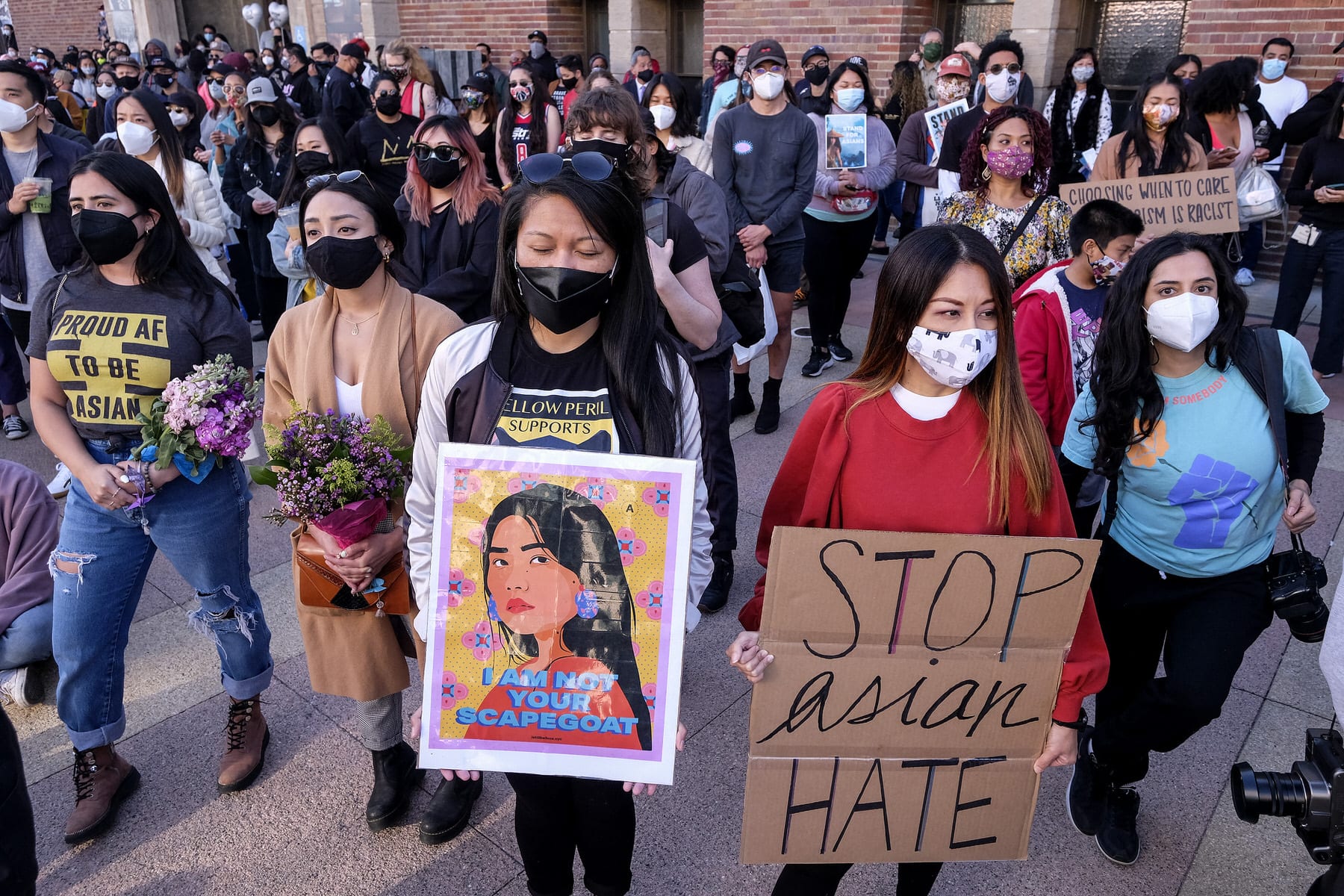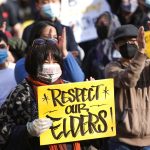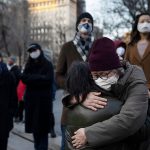In late January, President Joe Biden’s administration issued an executive memorandum aimed at addressing the growing violence against Asian Americans and Pacific Islanders. But that endeavor, still in the early stages, advocates say, requires a nuanced understanding of the complexity of the work left to be done.
The memorandum was designed to combat xenophobia and intolerance directed at the AAPI community — an issue that came into stark relief Tuesday night in Atlanta, when a White male shooter killed eight people, including six Asian American women, an attack that is being decried as an racist and misogynistic act.
Much of the memo, signed January 26, attempted to correct some of the past language that has taken hold during the pandemic, some of it popularized by former President Donald Trump, which many argue helped stoke xenophobia. In his first presidential address, Biden addressed the shift in tone his administration hoped to convey by describing “vicious hate crimes against Asian Americans who have been attacked, harassed, blamed and scapegoated” as “un-American.”
In the memo, Biden also directed all federal agencies and executive departments to ensure documents or statements “do not exhibit or contribute to racism, xenophobia, and intolerance against Asian Americans and Pacific Islanders.”
But language is only a small piece of addressing a larger, systematic problem, advocates say, and needs to be paired with resources and funding.
To that end, the administration began holding listening sessions earlier this month, both through the White House and the Department of Justice, to address the other elements of the memorandum. Specifically, Biden has called on the attorney general to help prevent violence against AAPI people and collect better data on hate crimes. The Department of Health and Human Services was also asked to consider issuing guidance on how to advance better cultural sensitivity toward the AAPI community in the federal COVID-19 response.
A White House spokesperson said in a statement that that work has begun through two listening sessions — one held by Domestic Policy Adviser Susan Rice and White House Public Engagement Director Cedric Richmond, and another held by the Department of Justice — but it has not quite yet begun at HHS, as a secretary has not yet been confirmed.
HHS said in a statement that it has “begun planning efforts” to respond to the memorandum.
Mahnoor Hussain, the policy & partnerships manager for South Asian Americans Leading Together, who attended the session with Rice and Richmond, said the efforts from the administration are encouraging, but have not yet been paired with significant actions.
“Everyone made clear that we want to the administration to actually act on the memo, but we really didn’t get a clear sense of what is happening,” Hussain said.
Instead, the groups focused on outlining where they believe the administration should start, and almost all said that focus should be put on funding community organizations that work directly with victims of violence.
Thu Nguyen, the director of OCA – Asian Pacific American Advocates, attended both sessions said community organizers have historically been the only ones doing the work on behalf of AAPI communities — often with little support.
“Our communities need to turn the focus on local groups, and to put resources into community organizers, providing resources for victim follow-up, because that’s the most important,” Nguyen said.
DOJ, she said, specifically committed to setting aside some funding for local DOJ bureaus to address the problem at the ground level. The department also promised that the listening session, held March 5, was the first of a long series, Nguyen said. The department did not respond to a request for comment from The 19th.
Until the shooting in Atlanta, some participants said they hadn’t heard back from the White House of DOJ. In light of the attack, Hussain said Richmond is holding another call with AAPI organizations this week to discuss next steps.
For its part, DOJ outlined in a memo following the first listening session that it “plans to make clear that this issue is among our highest priority, engage in increased outreach, and dedicate resources to combat the threat.” In the months since the signing of the executive memorandum, the department said it has been working on outreach to state and local law enforcement to improve training and has monitored reports from organizations like Stop AAPI Hate on incidents of violence.
Crimes against the AAPI community have been underreported because of a belief that those crimes aren’t taken seriously, Nguyen said. To rebuild that trust, DOJ said it wants to host hate crime forums focused on state and local law enforcement and other groups to raise awareness, but no such events are on its calendar so far.
Groups like Stop AAPI Hate were born of that gap in reporting. It’s a trend that has played out often for communities of color that have to rely on local and regional organizers to invest resources in data and reporting in lieu of a federal response.
Stop AAPI Hate, for instance, has cataloged reports of 3,795 hate incidents against the AAPI community between March 19, 2020, to February 28, 2021. About 68 percent were against women, and businesses were the primary site of the incidents. The report was published the same day as the mass shooting in Atlanta.
The intersection of gender and race has increasingly become a key part of the conversation around the nature of the violent incidents — most perpetuated against seniors or women. Groups like the National Asian Pacific Women’s Forum have asked for renewed focus on this point, drafting a petition for federal leaders seeking a response that centers intersectionality.
“We must call this moment what it truly is: white supremacy, anti-Asian racism, sexism, and sexual violence against Asian American women,” the group wrote.
Limited disaggregated data on the AAPI community by gender, ethnicity and other demographic factors has perpetuated a lack of understanding on the AAPI experience.
To address that, DOJ says it is looking at expanding in-house data collection and reporting on crime against AAPI individuals through a new community outreach program; translating resources in the four most common AAPI languages; and a new grant program for additional law enforcement training.
All of that work, however, is in the early stages — and there is a lot left to be done to understand the nuances of the community.
Tavae Samuelu, the executive director of Empowering Pacific Islander Communities, who also attended both meetings, said that even the conversation around how violence is affecting the AAPI community needs to be more focused. Much of the virtrol is focused on Asian Americans, she said. Pacific Islanders haven’t experienced the same level of violence. Their central issue during this past year, she said, has been higher rates of coronavirus infection and death.
“What I was lifting up was: I’ve been invited to a table to talk about anti-Asian racism, but not to the table to talk about COVID and what we’re actually naming and lifting up as a primary issue that our community is dealing with right now — the biggest threat to our survival,” Samuelu said.
That is a key giveaway, she said, that the commitment from the federal government still requires more refining.
“Do I think this administration understands our community? No,” Samuelu said. “With this administration, there is more willingness to listen. This is an administration that has said it would prioritize racial equity and racial equity is a throughline of every department. I think that’s the part that folks are trying to figure out.”
Samuelu also said that focus on funding for community organizations is paramount, as they are often the first point of contact and the most trusted messenger for marginalized communities. The response to anti-AAPI sentiment should also include support for mental health and for eliminating barriers to access aid.
To get there, it often takes a tragedy that pulls groups like hers from invisibility, Samuelu said.
“We recognize, too, that half the time what we’re asked to do to demonstrate significance is actually to operate in scarcity and be like, ‘We have it the worst,’” she said. “You have to expose every wound in order for folks to feel like they are seen.”






